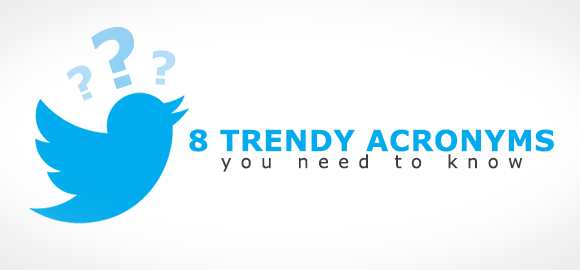 People are using abbreviations on Twitter and the FBI is ON IT. A list of almost 3,000 acronyms intended to help agents navigate the world of social media has been released (most of us manage just fine with Google, but these people can’t resist a good dossier) after a freedom of information request. As well as pointing out that COP can mean both “officer of the law” and “close of play”, it includes classics such as FMTKFYTFO (for me to know, for you to find out) and YKWRGMG (you know what really grinds my gears?). These phrases, of course, are just as likely to be used by terrorists plotting mass-murder as by teens engaged in prom-committee election manoeuvring. Personally I feel reassured that security experts are being trained in their use.
People are using abbreviations on Twitter and the FBI is ON IT. A list of almost 3,000 acronyms intended to help agents navigate the world of social media has been released (most of us manage just fine with Google, but these people can’t resist a good dossier) after a freedom of information request. As well as pointing out that COP can mean both “officer of the law” and “close of play”, it includes classics such as FMTKFYTFO (for me to know, for you to find out) and YKWRGMG (you know what really grinds my gears?). These phrases, of course, are just as likely to be used by terrorists plotting mass-murder as by teens engaged in prom-committee election manoeuvring. Personally I feel reassured that security experts are being trained in their use.
We know that intelligence agencies see communication on social media as a legitimate target for surveillance. In the UK, the director general of the Office for Security and Counter-Terrorism has said as much. And, if we publish our ramblings for all to see, it’s hard to argue that they’re not fair game. But the essentially private nature of this kind of chatter is clear when we look at the language used.
There’s a long history of cliques and subcultures modifying the way they speak or write. They might do it to evade detection, or to strengthen the bonds of group membership by excluding others. The results are not languages, exactly, but sub-languages, byways that weave between the main roads of common parlance, navigable only if you have the right kind of map. They have been called slangs, argots or cants. The circle of those who can understand may be as intimate as two, or it can encompass whole communities of strangers.
Abbreviations often arise when technological or physical constraints apply. Twitter has its strict 140-character limit; in comment threads or on forums, it becomes tiresome to have to type out long phrases. As Tom Standage has pointed out, similar constraints gave rise to the short forms used on Roman wax-tablet messages: SVEEB meant “If you are well, that is good, I am well” (si vales, bene est, ego valeo). SPD was short for “Sends many greetings” (salutem plurimam dicit). Now, as then, people who have something risky to say can make a virtue of these necessities. An abbreviation saves time, but it can also act as a means of addressing only those in the know.
Sometimes this can be a question of survival. For speakers of Polari, a gay argot that cobbled together abbreviation, rhyming slang, Yiddish, Italian, and French, identifying allies was crucial. If you ventured a “Bona riah, cove” and you were met with a smile and a thank you, you were probably safe. And though there was always the risk of encountering an undercover charpering omi (policeman), it’s unlikely he would have been able to pull off Polari very convincingly.
 Verbal tricks that require practice are generally a good way of befuddling parents, teachers or cops. Backslang, where the syllables in a word are reversed, cropped up in Polari but the best known example of it is French Verlan – which itself comes from a back-to-front rendering of the phrase l’envers. It was created by the marginalised inhabitants of banlieues, who often found themselves in conflict with authority. Some forms, such as beur for Arab, or meuf for woman, have become part of the standard language.
Verbal tricks that require practice are generally a good way of befuddling parents, teachers or cops. Backslang, where the syllables in a word are reversed, cropped up in Polari but the best known example of it is French Verlan – which itself comes from a back-to-front rendering of the phrase l’envers. It was created by the marginalised inhabitants of banlieues, who often found themselves in conflict with authority. Some forms, such as beur for Arab, or meuf for woman, have become part of the standard language.
It’s easy to see how an the internet could give rise to an explosion of argots. It is a place where everyone meets, with very little to distinguish them other than the words they type. This crowd separates out into groupuscules tailored to particular interests. Specialised language follows. And as far as teenagers – the most prolific users of social media – are concerned, there’s a lot to be said for language that can help prove you’re cool, that you know the latest gossip, or stop your parents finding out what you’re up to (can’t type now, PLOS – parents looking over shoulder).
What’s less clear is why the FBI wasted its time compiling a list of abbreviations like the one revealed this week. Not simply because all those definitions are readily available on the internet (maybe – the irony! – they’re worried about their search history being snooped on). Not even because the kinds of abbreviations used are hardly the stuff of criminal plots (PIMPL – pee in my pants laughing, anyone?). But because it’s in the nature of slang that it constantly evolves to outpace the predations of those in authority. As soon as it ceases to be useful as a disguise, an in-joke, a way of sticking two fingers up to the man, no one who really wants to cover their tracks will use it. DYKWIM?













